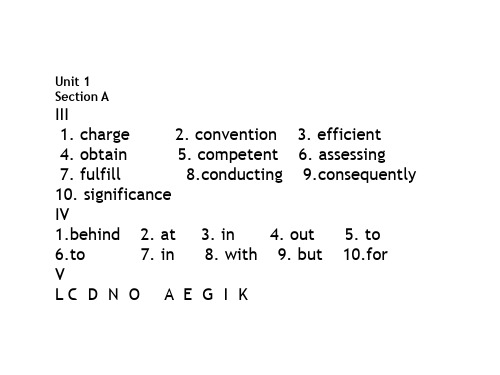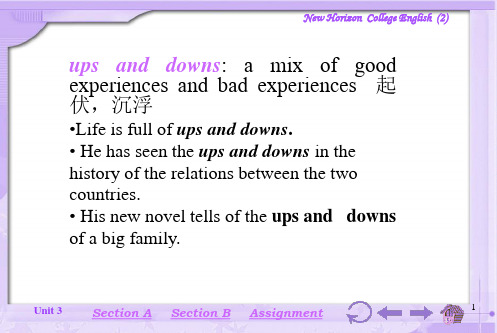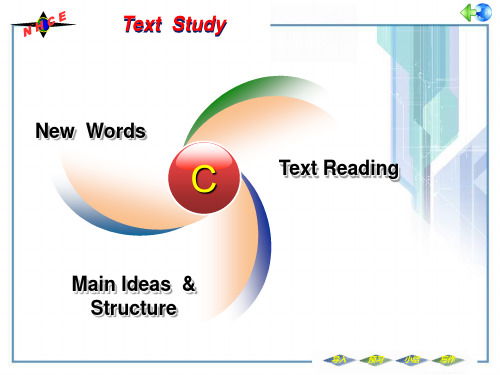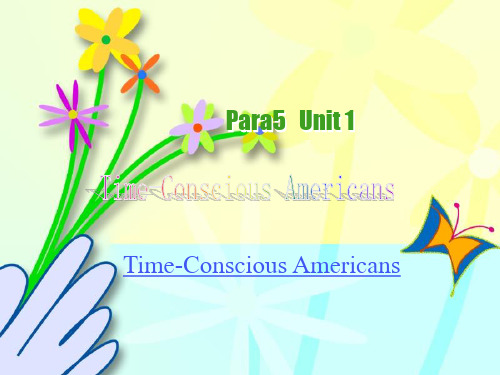新视野大学英语读写教程二-Unit-1-课件
第二版新视野大学英语读写教程第二册unit 1课后练习答案PPT

4. The increase in their profits is due partly to their new market strategy. 5. Such measures are likely to result in the improvement of work efficiency. 6. We have already poured a lot of time and energy into the project, so we have to carry on.
Section B II D 2.A 3.C 4.D 5.A 6.C 7.B 8.B III 1. utilize 2. reject 3. considerable 4. temporary 5. acceptable 6. recognition 7. alleviate 8. appreciate 9. furthermore 10. Interact
VIII 1. much less can he write English articles 2. much less can he manage a big company 3. much less could he carry it upstairs 4. much less have I spoken to him 5. much less to read a lot outside of it
Cloze 1.C 2.B 3.B 6.B 7.C 8.D 11.D 12.C 13.C
4.A 9.A 14.B
5.D 10.C 15.A
• XIV • A larger and larger part of society is expressing its concern about environmental protection. Active in their concern, teachers and students hold specific meetings to discuss environmental protection. Also, city planners take environmental problems into serious consideration. And, though reducing pollution can be expensive , factories often take every possible measure to do their part. Many people are concerned and active because air and water pollution affects everyone and makes it difficult for cities to survive and businesses to make a profit.
新视野大学英语读写教程2Unit

12
New Horizon College English (2)
Gail sometimes wondered why I and other blacks were so involved with the racial issue,…(Para. 2)
Meaning: Gail sometimes expressed a wish to know why I and other blacks gave so much time, energy and attention to the racial issue.
Try to show some tolerance.
religious tolerance 宗教宽容
Many old people have limited tolerance to cold.
They have a policy of zero tolerance (绝不容忍的 政策) for dishonesty.n. confro来自tationUnit 3
Section A Section B Assignment
3
confrontation n.
New Horizon College English (2)
• The young man had a confrontation with the policemen
• Compromise is an inevitable part of marriage. • To stop the argument they decided on a
compromise. • Everyone has to be prepared to make
compromises .
新视野大学英语读写教程2Unit1课件

2
1
The End of Warming-up
To Section A
Compound Dictation
Directions: You will hear a passage three times. When the passage is read for the second time, you are required to fill in the blanks numbered from S1 to S8 with the exact words you have just heard. For blanks numbered S9 to S11 you are required to fill in missing information. For these blanks, you can either use the exact words you have just heard or write down the main points in your own words. Now listen to the passage.
2
1
Warming-up
What is the polite way in the U.S.? Calling ahead of time.
2
1
Warming-up
Situation 2: Your American friend invited you to her party tonight at 7:30. When are you supposed to get there? Why? A. Before 7:00, to help her to prepare. B. 5’~10’ late, not to be the first guest. C. After 8:00, I’m the VIP. D. 5’~10’ earlier, it’s a polite way to show my respect for her.
《新视野大学英语读写教程》(第二册)Unit1Time_ConsciousAmericans

《新视野大学英语读写教程》(第二册)Unit1Time_ConsciousAmericans教材New Horizon College English《新视野大学英语读写教程》(第二册)外语教学与研究出版社授课内容Unit 1 Time-Conscious Americans 学时2*3教学目的Teaching Objectives1. Learn about cultural differences about time consciousness.2. Scan Passage A and understand the main idea of the tex t “Time-Conscious Americans”.3. Understand the structure of the text and the devices for developing it.4. Master the Key Language Points and Grammatical Structures in the T ext.教学重点与难点Teaching emphasis:1. organizing a paragraph with a general statement supported by specific details and the reason2. key words, phrases and some useful sentence patterns;Teaching difficulties: Reading for the main ideas in paragraphs教学方法与手段Teaching method:lecture with pair work and group discussionThe mixture of listening, speaking, reading, practicing and writing Teaching aids: textbook,Multi-media and blackboard 课时安排第一次课1-2 periodⅠWarm-up Activity1.Group work 15m2.Questions for thought and discussion 15mⅡBackground Information 10mⅢ listening 25mⅣ watch and Answer 25m第二次课3-4 periodⅤText Analysis·Global Reading 25m1. Main idea2. Text structure·Detailed Reading 65mWordsPhrasesLanguage points第三次课5-6 periodLanguage points 15mⅥText Summary 5mⅦWriting 25mⅧExercise Explanation 45m教学要点Teaching Points:1. Let the Ss know the learning objectives of this unit;2. Help the Ss understand the text as a whole and know some background knowledge;3. Have the Ss know some ideas of fame;4. Guide the Ss use freely the active expressions, key grammatical points and sentence patterns in this text.作业布置与思考Assignments:1. Vocabulary: Students are asked to master the key words and phrases.2. Sentence Structure: Teacher summaries the usage of “either…or” and “where” and Studentspractice rewriting sentences after the models.3. Translation教学参考书和网络资源Reference Books and Resources:1. Teacher’s Book of New Horizon College English2. Longman Dictionary of Contemporary English (English-Chinese)3. Oxford Advanced Learner’s English-Chinese Dictionary4. Longman Dictionary of American English5. On-line resources: English on line教学过程1-2 PeriodⅠWarm-up Activity (提问板书)1. Group work:1) Find out idioms Chinese have about time.Time is money.(时间就是金钱或一寸光阴一寸金)Time and tide wait for no man.(岁月不待人)Never put off till tomorrow what may be done today.(今日事,今日毕)2) Find out major differences of time between Chinese and English culture.Chinese Culture:a)masses (collectivism).b)human and 'heaven' as one (天人和一).c)ethics and tolerance (中恕之道).d)internal cultivation (修身养性).Western culture:a)Individualism.b)adventurous and exploration based.c)based on scienced)law to resolve people and people's relationship.e)'god' and religion to resolve human and spiritualism relationship.2. Questions for thought and discussion:(提问课本)1)What precious resources do Americans value and save?2)What are the three kinds of behavior that Americans consider to be a waste of time?3)In what different ways do Americans approach time in business relations?Ⅱ Background Information: (讲解课件)1. Cultural Conflicts:Each nation has its own conventions. Different nations have different cultures. When two cultures clash, problems in communication may occur. Which side should compromise when there are cultural conflicts? In fact, knowing and understanding the other's culture is the responsibility of both sides, and both sides should be willing to compromise. Educating, rather than complaining and blaming, is the best solution to cultural conflicts.2. Hourglass:A glass container holding fine sand for measuring time, which is narrow in themiddle like a figure 8 so that the sand inside can run slowly from the top half to the bottom taking exactly one hour.。
新视野大学英语读写2 第三版 B2U1 Section A(ppt课件)

学习交流课件
4
Project of the unit
Task Discuss the following questions.
1. What are the key factors that help people learn English as a foreign language?
2. Do you have any problem in English learning?
3. Do you think grammar is important in English learning?
学习交流课件
5
Inspiring your thoughts
Global understanding
学习交流课件
6
Inspiring your thoughts
Task 1 Global understanding of the main idea
学习交流课件
2
2
Section A An impressive English lesson
Project of the unit Inspiring your thoughts
Enhancing your skills
学习交流课件
3
Project of the unit
Lead-in
Project forecasting
新视野大学英语2UNIT1的课件

词组的学习 ['kɔnsikwentli] ɔ 结果,因此,所以。 结果,因此,所以。 Noun: consequence 结果 后果 ; 结果,后果 : 重大,重要 自大,神气活现 重大 重要 ;自大 神气活现 等。 Adjective: consequent 随之发生的, 随之发生的, : 因...的结果而起的 。 的结果而起的 as a consequence of 由于 由于……的结果 的结果 因此。 ,因此。
因此,我们千方百计地节约时 间。我们发明了一系列节省劳 力的装置;我们通过发传真、 打电话或发电子邮件与他人迅 速地进行交流,而不是通过直 接接触。虽然面对面接触令人 愉快,但却要花更多的时间, 尤其是在马路上交通拥挤的时 候。因此,我们把大多数个人 拜访安排在下班以后的时间里 或周末的社交聚会上。
•
do sth. by / through … rather than by / through …, which, though …, … — especially given …
某人是通过······而不是通过 而不是通过······做某事。虽 做某事。 某人是通过 而不是通过 做某事 然后者······, 但却 但却······,尤其是考虑到 然后者 ,尤其是考虑到······。 。
我会骑自行车去上学而不是坐公共汽车这虽然很方源自但却更拥挤特别是考虑到在早上的人群
Para5 Unit 1
Time-Conscious Americans
• Consequently, we work hard at the task of saving time. We produce a steady flow of labor-saving devices; we communicate rapidly through faxes, phone calls or emails rather than through personal contacts, which though pleasant, take longer – especially given our traffic filled streets. We, therefore ,save most personal visiting for after-work hours or for social weekend gatherings.
新视野大学英语第三版读写教程第二册 Unit1

Unit 1Learning the art of critical thinkingA. There is nothing more practical than sound thinking. No matter what your circumstance or goals, no matter where you are, or what problems you face, you are better off if your thinking is skilled. As a manager, leader, employee, citizen, lover, friend, parent –in every realm and situation of your life –good thinking pays off. Poor thinking, in turn, inevitably causes problems, wastes time and energy, and engenders frustration and pain.B. Critical thinking is the disciplined art of ensuring that you use the best thinking you are capable of in any set of circumstances. The general goal of thinking is to "figure out the lay of the land" in any situation we are in. We all have multiple choices to make. We need the best information to make the best choices.C. It is important to realize that serious study of thinking, serious thinking about thinking, is rare. It is not a subject in most colleges. It is seldom found in the thinking of our culture. But if you focus your attention for a moment on the role that thinking is playing in your life, you may come to recognize that, in fact, everything you do, or want, or feel is influenced by your thinking.D. To make significant gains in the quality of your thinking you will have to engage in a kind of work that most humans find unpleasant, if not painful – intellectual work. Yet once this thinking is done and we move our thinking to a higher level of quality, it is not hard to keep it at that level. Still, there is the price you have to pay to step up to the next level. One doesn't become a skillful critic of thinking overnight, any more than one becomes a skillful basketball player or musician overnight. To become better at thinking, you must be willing to put the work into thinking that skilled improvement always requires.E. This means you must be willing to practice special "acts" of thinking that are initially at least uncomfortable, and sometimes challenging and difficult. You have to learn to do with your mind "moves" analogous to what accomplished athletes learn to do (through practice and feedback) with their bodies. Improvement in thinking, in other words, is similar to improvement in other domains of performance where progress is a product of sound theory, commitment, hard work, and practice. Consider the following key ideas, which, when applied, result in a mind practicing skilled thinking. These ideas represent just a few of the many ways in which disciplined thinkers actively apply theory of mind to the mind by the mind in order to think better.1. Clarify your thinking.F. Our own thinking usually seems clear to us, even when it is not. But vague, ambiguous, muddled, deceptive, or misleading thinking are significant problems in human life. If we are to develop as thinkers, we must learn the art of clarifying thinking, of pinning it down, spelling it out, and giving it a specific meaning. Here's what you can do to begin. When people explain things to you, summarize in your own words what you think they said. When you cannot do this to theirsatisfaction, you don't really understand what they said. When they cannot summarize what you have said to your satisfaction, they don't really understand what you said. Try it. See what happens.2. Stick to the point.G. Be on the lookout for fragmented thinking, thinking that leaps about with no logical connections. Start noticing when you or others fail to stay focused on what is relevant. Focus on finding what will aid you in truly solving a problem. When someone brings up a point (however true) that doesn't seem pertinent to the issue at hand, ask, "How is what you are saying relevant to the issue?" When you are working through a problem, make sure you stay focused on what sheds light on and, thus, helps address the problem. Don't allow your mind to wander to unrelated matters. Don't allow others to stray from the main issue. Frequently ask: "What is the central question? Is this or that relevant to it? How?"3. Question questions.H. Most people are not skilled questioners. Most accept the world as it is presented to them. And when they do question, their questions are often superficial or "loaded". Their questions do not help them solve their problems or make better decisions. Good thinkers routinely ask questions in order to understand and effectively deal with the world around them. They question the status quo. They know that things are often different from the way they are presented. Their questions penetrate images, masks, fronts, and propaganda. Their questions make real problems explicit and discipline their thinking through those problems. If you become a student of questions, you can learn to ask powerful questions that lead to a deeper and more fulfilling life. Your questions become more basic, essential, and deep.4. Be reasonable.I. One of the hallmarks of a critical thinker is the disposition to change one's mind when given good reason to change. Good thinkers want to change their thinking when they discover better thinking. They can be moved by reason. Yet, comparatively few people are reasonable. Few are willing to change their minds once set. Few are willing to suspend their beliefs to fully hear the views of those with which they disagree. How would you rate yourself?J. The extent to which any of us develops as a thinker is directly determined by the amount of time we dedicate to our development, the quality of the intellectual practice we engage in, and the depth, or the lack thereof, of our commitment to becoming more reasonable, rational, successful persons.1. Critical thinking is a kind of art that can be trained to guarantee that you use the2. If other people are not satisfied with your summary of what they said, it means you have problems understanding what they said.4. You may find that your thinking influences whatever you do, or want, or feel, if5. Most people are unwilling to suspend their beliefs and seriously listen to others'6. Intellectual work, though unpleasant for most people, can help us make great8. In order to avoid thinking fragmentedly, you need to concentrate on finding the key9. Critical thinkers will change their minds when there are good reasons to do so,10. The process of learning to train your mind is similar to the process of athletes learning to train their bodies.1-5:BFACI6-10:DHGIE。
新视野大学英语读写教程2-Unit1

Unit1SectionATime-Conscious AmericansDetailed study of the T extfollowed by adjectives.More examples:The room stands idle .这房间闲置着。
Stand firm-don’t let them tell you what to do.要坚定,不要让他们对你指手画脚。
They stand opposed to the new law.他们反对这项新法律。
2.…you are falling behind. (Para.1)★fall behind : move more slowly than other people so that one is behind them.fall behind in science在科学方面落后fall behind one’s competitors落后于竞争对手。
The student has been working hard for fear that he shuold fall behind .这个学生一直很努力,唯恐落后。
3.This attitude results in a nation of people committed to researching ,experimenting andresult in : make something happen; causeActing before thinking always results in failure.做事不事先考虑总会导致失败。
The accident resulted in the death of two people.这场事故造成两人死亡。
★compare:result from:be caused by something that has happened previouslyNothing has resulted from his efforts.他的努力终成泡影。
- 1、下载文档前请自行甄别文档内容的完整性,平台不提供额外的编辑、内容补充、找答案等附加服务。
- 2、"仅部分预览"的文档,不可在线预览部分如存在完整性等问题,可反馈申请退款(可完整预览的文档不适用该条件!)。
- 3、如文档侵犯您的权益,请联系客服反馈,我们会尽快为您处理(人工客服工作时间:9:00-18:30)。
3. elbow n. 肘部 at one’s elbow = at hand 在手边,随时
可用 elbow one’s way through a crowd 从人群
中挤过去 vt. 用肘推/撞 My neighbor elbowed me a few times to
wake me up in English class.
12. fulfill vt. 完成(实现),履行(执 行),满足(符合)
I give you three days to fulfill the mission. 我给你三天时间完成任务。 You must fulfill your promise. 你必须履行诺言。 Does your job fulfill your expectations? 你的工作符合你的期望吗?
fulfill one’s hopes/expectations 符合某人 的期望
fulfill the need of 满足…的需要 fulfill one’s duties 完成某人的任务 fulfill a command 执行命令 fulfillment n.
国会通过了新的教育预算。
vt. 制定预算
The government has budgeted 10,000,000
pounds for education spending.
政府将一千万英镑编入教育预算。
budget … for sth. 为 ... 做预算
budget doing sth. 为 ... 做预算
9. electronic a. 电子的,电子设备的 electronically ad. 电子地 electronics n. 电子学 electric a. 电的,与电有关的 electrical a. 电气的 electricity n. 电 10. significance n. 重要性,重要意义 significant a. 重要的,有重要意义的 significantly ad.重要地,有重要意义地 insignificance n. 不重要的事物
大学英语(二) 读写教程
2011-2012(二)学期 大学英语(二)B 班 教学内容
大学英语读写/听说 第二册1/3/5/7 第三册1/6)
读写教程
本学期英语成绩考核说明:
期末总成绩=卷面成绩40%+平时成绩60%
平时成绩(60分) 1. 三次月考(45分) 2. 平时作业(10分) 3. 课堂表现( 5分)
告 They charged the fault on him. 他们把过失归咎于他。 charge sth. on sb. 把过失归咎于某人 sb. be charged on sth. He forgot to charge the battery. 他忘记给电池充电了。
8. probe v. 调查,探究 (investigate) The journalist was probing into several
financial scandals. 那记者正在调查几起财务丑闻。 probe into 调查,探究 probe sb. on sth. 向某人调查某事 n. 探针,探测器
5. leisure n. 空闲,悠闲 How do you usually spend your leisure
time? 你通常是怎样度过你的空闲时间? at leisure 有空,闲着无事 at one’s leisure 在某人有空/方便时 leisurely a./ad. 休闲的(地),从容不迫
2021
4. ritual a. 例行的,惯常的 The teacher would start his lecture by a
ritual greeting of saying “Good Morning class”. n. 惯例 go through the ritual 按部就班 have the ritual of doing sth. = have the habit of doing sth. 有做某事的习惯
的(地)
6. assess vt. 评估,评价 (评估价格)
She looked at the house and assessed its market
value.
她看了看房子并估算了其市场价值。
assessment n. 评估
7. surroundings n. 周围事物
charge n. 费用,控告,责任,电荷 be in charge of 负责,掌管 be in the charge of 受…控制 Rub the leather and the rubber will
produce the charge. 摩擦皮毛和橡胶会产生电荷。
Animals in zoos are not in their natural
surroundings.
动物园里的动物不是生活在自然环境中。
surroundings 在概念上比environment 的范围 要小。
surround v. 包围,环绕
surrounding a. 周围的,环绕的
考勤: 迟到一次扣1分, 无故旷课一次扣2分, 病假、事假需要提前上交有班主
任签字和学院盖章的正规请假条 。
Unit 1 Key Words
1. budget
n. 预算
Congress has approved the new
educational budget.
Vt. (为…)作出安排
If you want to live a successful life on campus, you have to budget your time carefully.
budget (plan, arrange, schedule)
2. charge v. 收费,控告,归咎于…,充 电
How much do you charge for the air conditioner?
空调多少钱?
charge for sth. 为…要收费
The suspect was charged with murdering his wife.
嫌疑犯被控诉为谋杀他的妻子。 charge sb. with sth. 为某事控告某人 sb. be charged with sth. 由于某事,某人被控
www.1ห้องสมุดไป่ตู้
11. competent a. 有能力的,强调能够胜任的 able a., capable a. 都强调有能力 be competent at /for /in sth. 在某方面很能干,
能够胜任 be able to do sth. 有能力做某事 be capable of sth./of doing sth. 有能力做某事 competently ad. competence n. incompetent a. 无能的,不称职的
